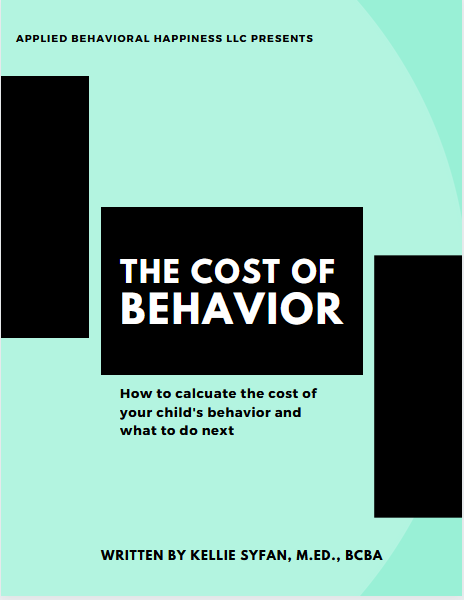Parents are experiencing an increase in the frequency and intensity of their child’s behavior during COVID. This increase is a reaction to our difficult times…and it’s costing you money.
Actual money out the door
Are daycare facilities, preschools, friends or babysitters refusing to help because of your child’s behavior? Every time you have to deal with the behavior instead of working, that’s real money going out of the door. If they break things or injure someone, that can cost money too. The bills can start to be staggering when you pay attention to them.
Cost in time
An easy way to calculate how much or time is worth is to look into how much one is paid to do the job you are doing or are most qualified to do. How much time are you spending on these behaviors that could have been spent elsewhere?
Pro tip: If you don’t know, we have a guide at the bottom of this article that will help you calculate what you are losing.
There are solutions and you have options: let’s talk about it.
First step: Meet with your pediatrician
Children sometimes cannot explain that they are hurting or that pain and discomfort has led them to act out. Here are some things that they might check for:
- UTI, ear infections, and other infections
- Allergies
- Acid reflux
- Toothache

Pro tip: We have a list of things to know ahead of time and questions to ask your provider as a part of the free guide at the bottom of this article.
Next step: Consider a psychological assessment
Assessments are common and are conducted by your pediatrician, the school psychologist, or a specialist. Here are a few common disorders and conditions that are associated with behavioral challenges:
- OCD
- ODD
- ADD/ADHD
- ASD
- Anxiety
A diagnosis can free up insurance money and an individualized education plan (IEP). As well, understanding that your child may be coming from a place of neurodiversity and not animosity can help you forgive them (and yourself) for the difficult times and set you up to better support them in the future.
Third and most important step: Behavioral Support
Behavior Specialists and BCBA
You want to look for someone that specializes in behavior and can help your child, you, and your family. Consider looking into a highly qualified behavior analyst (BCBA). Here is our website as an example of one option.
Pro tip: Be sure that you are paying for someone who really knows what they are doing so that you make a worthy investment. A behavior “specialist” can mean everything from someone who has a some experience, to someone who has a taken a few classes, to someone who has is fully board certified. Also, you can look up any BCBA on the BACB website to make sure they are for real.
Psychological Behavioral Support
Start by checking out acceptance and commitment therapy or ACT. ACT was developed from a behavior analytic and mindfulness perspective. You can also look into DBT, CBT, and play based therapy, among others.
Pro tip: use the search function on the Psychology Today website to find providers in your area, that take your insurance, and that match your exact needs and preferences.
Support Groups
These groups may be led by a providers, professionals, or parents who knows what you’re going through and are focused on helping support you as a parent.
We have a virtual support group available that you can sign up for by joining our Facebook group or you can check out Meet Up for other options. There are a ton of options out there, both virtually and in person.
Parenting Webinars and Workshops
Like the social groups, these may be led by providers, parents, or professionals and are full of good tips and tricks. Look for reputable groups offering the webinar so that you don’t waste your time.
Pro tip: See if the person or group offers a free workshop or webinar before you invest in paid workshops. We hold a free webinar weekly to help more people access support (click here to check it out).
Online courses and tools
Courses tend to be more expensive than workshops or webinars (because they are more expansive) so I suggest doing a little more background checking before you move forward. Check for money back guarantees and other types of quality assurance. Here is an examples of online courses and tools that are available to you.
Pro tip: check the website for a media page: it’s a shortcut for checking to see if anyone else trusts this person as a professional.
Free Behavior Support Guide
This 10-page eBook will help you calculate the cost of behaviors now, gather the data needed to make the visit with your pediatrician valuable, and help you choose what kind of supports you want to look into.
Click here to get the free eBook now!



